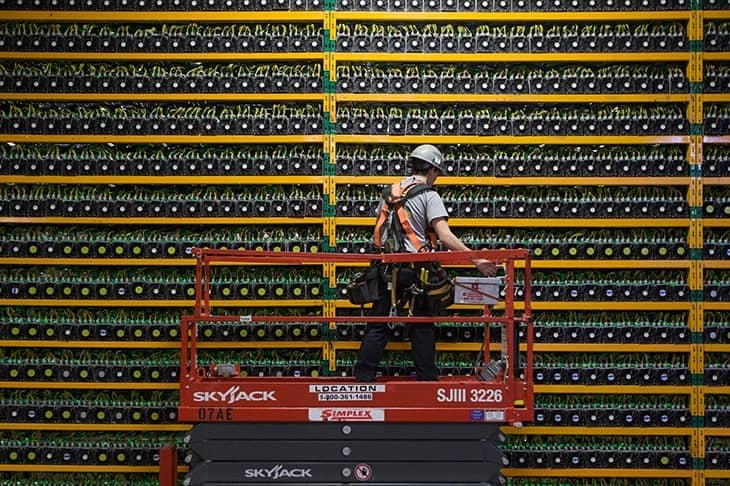President Biden’s executive order ‘Ensuring Responsible Development of Digital Assets’ won praise on all sides, an unfamiliar experience for one routinely dismissed these days as lacking the vigour or grip needed for presidential leadership. The order does little more than call for cross-government research into all things crypto. But in doing so it pleased bitcoin fanciers, NFT collectors and their ilk by acknowledging that their $3 trillion market is here to stay – while also giving comfort to sceptics who’d prefer to see crypto dealings brought under regulatory control like any other financial activity, rather than abandoned to the libertarian anarchy favoured by ardent cryptonauts.
But that latter fantasy can’t happen until cryptocurrencies become so universal that they no longer need to interface with dollars and pounds. And the companies that provide that exchange can’t operate outside corporate rules, so we’re seeing the likes of Coinbase, Binance and Kraken falling into line, however reluctantly, by blocking suspect Russian accounts. Meanwhile, entrepreneurs and central banks alike explore the potential uses of the blockchain – the engine-room of the crypto boom which many also see as the global money-transfer system of the future. If crypto criminals can be corralled while leadership of the sector stays in the US, rather than migrating to China, Biden’s order may come to be seen as a milestone.
The slippery slope
Oliver Bullough, author of Butler to the World: How Britain Became the Servant of Oligarchs, Tax Dodgers, Kleptocrats and Criminals, is an investigative writer who works fearlessly to expose the London-based nexus of corrupt plutocrats and their professional back-up that I called (in a review of his previous book, Moneyland) ‘a plague on 21st-century civilisation’. But as a City historian myself, I raise an eyebrow at Bullough’s assertion that the rot set in with the invention of the ‘eurobond’ as a means of recycling US dollar deposits held offshore – a market development that has been praised since its inception as an example of City agility in the era when brains and connections counted for more than trading-floor heft.
The Eurobond market’s first manifestation, in 1963, was a $15 million issue for Autostrade, the Italian motorway authority. The banker behind it was the great Siegmund Warburg, seeking to please his friend Guido Carli, governor of the Bank of Italy. Thereafter, every banker and lawyer in London wanted a piece of the eurodollar action, which multiplied in the 1970s with a flood of Middle Eastern oil money.
But was it morally wrong from the start? In a speech marking the 50th anniversary of the Autostrade deal, Peter Spira – the last survivor of the Warburgs team that launched it – observed that it succeeded because Autostrade was able to pay interest without tax deducted: ‘This, of course, was an essential feature to attract all those Belgian dentists and others who were the target buyers of the bonds, and who were not over-inclined to pay tax…’ Aha, says 20-20 hindsight, the slippery slope to the non-dom oligarch’s offshore-held Belgravia mansion.
Fertile ventures
Let’s talk fertiliser. Broadly speaking, and allowing for weather, the more you spread, the better your crops will be – and it’s thanks to nitrogen-based fertilisers that the planet is able to feed eight billion humans. But fertiliser prices more than doubled in the six months before the war, driven by the cost of gas used in manufacturing. And now supplies from Russia – which controls 30 to 40 per cent of world markets for ingredients such as ammonia, nitrogen and phosphorus – are impeded because western ships won’t take Russian cargoes and western ports won’t admit Russian ships.
Combine all that with the interruption of grain exports from Ukraine and – even with good spring harvests elsewhere – expect bread prices to soar, poor populations to go hungry and unrest to erupt as it did in the Arab Spring. As for the UK, we import at least 60 per cent of the fertiliser we need, at the mercy of global prices: one reason (alongside a general lack of respect for farmers from both consumers and politicians) why our food security is as weak as our energy security.
Since Russia and Belarus also control 40 per cent of the world’s potash fertiliser, this argues strongly for the acceleration of the Woodsmith polyhalite potash mine project on the North Yorkshire coast, which stalled when it was owned by Sirius Minerals (and when global supply looked ample) but is now in the hands of the giant Anglo–American conglomerate. And consider also CCm Technologies of Swindon, overall winner of The Spectator’s Economic Innovator Awards for 2021 and a pioneer of low-carbon fertilisers extracted from industrial waste and sewage treatment run-off.
Harnessed to water utilities across the country, CCm’s system should be capable of producing half a million tonnes of clean fertiliser a year, replacing a fifth of what we currently import. There could hardly be a better example of entrepreneurship rising to meet the moment. Stand by for news of our 2022 Innovator Awards opening for entries.
Drabness ahead
In these new inflationary times, I’m sometimes surprised that groceries at the Co-op or the fruit-and-veg stall are still so cheap; as are, for the time being, flights and shoes. But I’m horrified by the restaurant bills, train fares and carpark charges that also form part of my personal inflation calculator – and amused to see what the Office for National Statistics now includes and excludes from the basket of 700 items it uses to calculate consumer price inflation. Out have gone men’s suits, rarely bought these days, and doughnuts; in come meat-free sausages, canned lentils and antibacterial wipes. Wherever prices are heading, an era of drabness beckons.







Comments